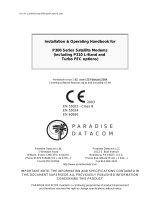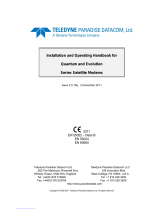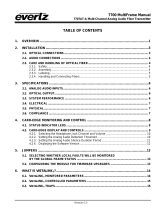evertz 7703PA‑LNB is a single channel amplifier with built-in LNB power up to 400mA. It can be used as a wideband amplifier without slope compensation for signals from 40-2300MHz or as an amplifier with slope compensation for extended L-Band signals from 950-2150MHz. The 7703PA‑LNB has a wide dynamic range (-10 to -60dBm), up to 0dBm output with low IMD, and is fully hot-swappable from the front of the frame. It also has comprehensive signal and card status monitoring via a four digit card edge display, up to 30 dB gain, adjustable in 0.
evertz 7703PA‑LNB is a single channel amplifier with built-in LNB power up to 400mA. It can be used as a wideband amplifier without slope compensation for signals from 40-2300MHz or as an amplifier with slope compensation for extended L-Band signals from 950-2150MHz. The 7703PA‑LNB has a wide dynamic range (-10 to -60dBm), up to 0dBm output with low IMD, and is fully hot-swappable from the front of the frame. It also has comprehensive signal and card status monitoring via a four digit card edge display, up to 30 dB gain, adjustable in 0.




















-
 1
1
-
 2
2
-
 3
3
-
 4
4
-
 5
5
-
 6
6
-
 7
7
-
 8
8
-
 9
9
-
 10
10
-
 11
11
-
 12
12
-
 13
13
-
 14
14
-
 15
15
-
 16
16
-
 17
17
-
 18
18
-
 19
19
-
 20
20
-
 21
21
-
 22
22
-
 23
23
-
 24
24
evertz 7703PA User manual
- Type
- User manual
- This manual is also suitable for
evertz 7703PA‑LNB is a single channel amplifier with built-in LNB power up to 400mA. It can be used as a wideband amplifier without slope compensation for signals from 40-2300MHz or as an amplifier with slope compensation for extended L-Band signals from 950-2150MHz. The 7703PA‑LNB has a wide dynamic range (-10 to -60dBm), up to 0dBm output with low IMD, and is fully hot-swappable from the front of the frame. It also has comprehensive signal and card status monitoring via a four digit card edge display, up to 30 dB gain, adjustable in 0.
Ask a question and I''ll find the answer in the document
Finding information in a document is now easier with AI
Related papers
Other documents
-
Inverto IDLU-UWT110-CUO1O-32P Installation guide
-
Inverto IDLU-UWT110-CUO1O-32P Unicable II Multi Switch Programmable cascadable Multi Switch User manual
-
Whyte WSCR504 User manual
-
 Paradise P300 User manual
Paradise P300 User manual
-
Hyundai UFT505 User manual
-
 Teledyne PD55 L Installation And Operating Handbook
Teledyne PD55 L Installation And Operating Handbook
-
Inverto 6100 Installation guide
-
Inverto 6098 Installation guide
-
Inverto Unicable II User manual
-
Inverto 6207 Installation guide


























